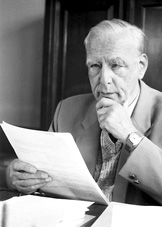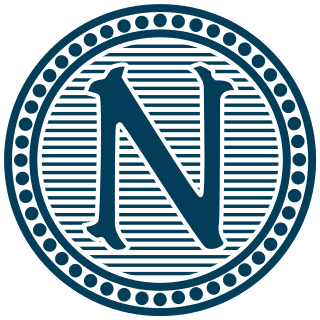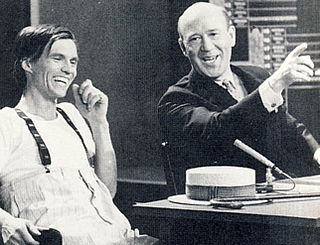Related Research Articles

The Nobel Prizes are five separate prizes awarded to those who, during the preceding year, have conferred the greatest benefit to humankind, as established by the 1895 will of Swedish chemist, engineer, and industrialist Alfred Nobel, in the year before he died. Prizes were first awarded in 1901 by the Nobel Foundation. Nobel's will indicated that the awards should be granted in the fields of Physics, Chemistry, Physiology or Medicine, Literature, and Peace. A sixth prize for Economic Sciences, endowed by Sweden's central bank, Sveriges Riksbank, and first presented in 1969, is also frequently included, as it is also administered by the Nobel Foundation. The Nobel Prizes are widely regarded as the most prestigious awards available in their respective fields.

The Nobel Prize in Physics is an annual award given by the Royal Swedish Academy of Sciences for those who have made the most outstanding contributions to mankind in the field of physics. It is one of the five Nobel Prizes established by the will of Alfred Nobel in 1895 and awarded since 1901, the others being the Nobel Prize in Chemistry, Nobel Prize in Literature, Nobel Peace Prize, and Nobel Prize in Physiology or Medicine. Physics is traditionally the first award presented in the Nobel Prize ceremony.

Ernst August Friedrich Ruska was a German physicist who won the Nobel Prize in Physics in 1986 for his work in electron optics, including the design of the first electron microscope.

The Norwegian Nobel Committee selects the recipients of the Nobel Peace Prize each year on behalf of Swedish industrialist Alfred Nobel's estate, based on instructions of Nobel's will.
The Kavli Institute for Theoretical Physics (KITP) is a research institute of the University of California, Santa Barbara dedicated to theoretical physics. KITP is one of 20 Kavli Institutes.

Lars Fredrik Nilson was a Swedish chemist, professor at Uppsala University, and later Director of the Agricultural Chemical Experiment Station at the Royal Swedish Academy of Agriculture and Forestry in Stockholm.

The Nobel Foundation is a private institution founded on 29 June 1900 to manage the finances and administration of the Nobel Prizes. The foundation is based on the last will of Alfred Nobel, the inventor of dynamite.

Otto Lennart Hyland, was a Swedish TV-show host and journalist and one of the most popular and renowned TV personalities in the history of Swedish television. His biggest success as an entertainer was unquestionably the show Hylands hörna, that aired from 1962 on Sveriges Television.

Lars Peter Hansen is an American economist. He is the David Rockefeller Distinguished Service Professor in Economics, Statistics, and the Booth School of Business, at the University of Chicago and a 2013 recipient of the Nobel Memorial Prize in Economics.
Lars Ernster was a professor of biochemistry, and a member of the Board of the Nobel Foundation.
Fredrik Stang Heffermehl was a Norwegian jurist, writer and peace activist. He worked as a lawyer and civil servant from 1965 to 1982 and was the first secretary-general of the Norwegian Humanist Association from 1980 to 1982. He later made his mark as a writer and activist for peace and against nuclear arms. He was the honorary president, and president, of the Norwegian Peace Council, a vice president of the International Peace Bureau, and a vice president of the International Association of Lawyers against Nuclear Arms.

Fredrik Ljungström was a Swedish engineer, technical designer, and industrialist.

The Nobel Prize in Literature, here meaning for Literature, is a Swedish literature prize that is awarded annually, since 1901, to an author from any country who has, in the words of the will of Swedish industrialist Alfred Nobel, "in the field of literature, produced the most outstanding work in an idealistic direction". Though individual works are sometimes cited as being particularly noteworthy, the award is based on an author's body of work as a whole. The Swedish Academy decides who, if anyone, will receive the prize.
Nilson is both a surname and a given name variant of Nelson.

The Nobel Committee for Chemistry is the Nobel Committee responsible for proposing laureates for the Nobel Prize in Chemistry. The Nobel Committee for Chemistry is appointed by the Royal Swedish Academy of Sciences. It usually consists of Swedish professors of chemistry who are members of the Academy, although the Academy in principle could appoint anyone to the Committee.

The Nobel Prize in Chemistry is awarded annually by the Royal Swedish Academy of Sciences to scientists in the various fields of chemistry. It is one of the five Nobel Prizes established by the will of Alfred Nobel in 1895, awarded for outstanding contributions in chemistry, physics, literature, peace, and physiology or medicine. This award is administered by the Nobel Foundation, and awarded by the Royal Swedish Academy of Sciences on proposal of the Nobel Committee for Chemistry which consists of five members elected by the Academy. The award is presented in Stockholm at an annual ceremony on 10 December, the anniversary of Nobel's death.

Lars Gunnar Edvard Nilson was a Swedish physician. He passed his mogenhetsexamen in 1890 and earned a Bachelor of Medical Sciences degree from Uppsala University in 1895. Nilson conducted study trips across several European countries before becoming a naval doctor for the Swedish Navy from 1898 to 1902. He completed his Licentiate of Medicine at the Karolinska Institute in 1899 and later became a naval surgeon in Karlskrona, where he oversaw the rebuilding of the Navy's hospital between 1906 and 1911.
Lars Nilsson may refer to:
References
- ↑ Nationalencyklopedin, band 14 (1994), uppslagsordet Nobelinstitut
- ↑ "Nobelinstitut". Nordisk familjebok (2nd ed.). 1913 – via Project Runeberg.
- ↑ Lars Fredrik Nilson, dödsruna av Å.G. Ekstrand i Svensk Kemisk Tidskrift (1899), sid. 143-146.
